Meet The Newest Faculty Members
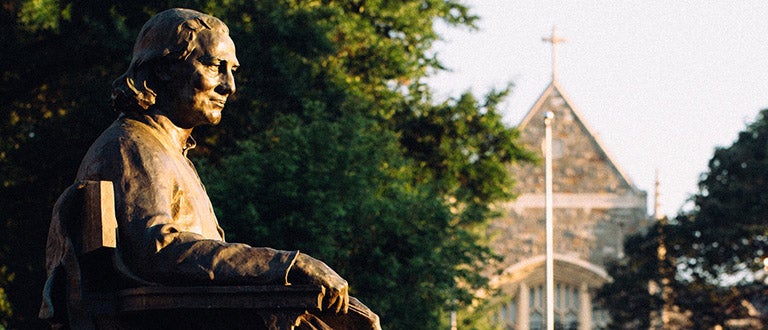
Statue of John Carroll
The Fall 2016 semester has brought a number of passionate and qualified new instructors to Georgetown College. Learn what they’re teaching, their research interests, and some of their extracurricular interests here.
LUKE KEELE
Department of Government
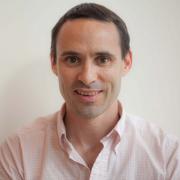 Luke Keele comes to the Hilltop as an associate professor at both the McCourt School of Public Policy and the Georgetown College department of government. An expert in statistical methods in the social and medical sciences, his research will focus on applying advanced statistics to the evaluation of labor market interventions, educational reforms and voter turnout. He has been published in the Annals of Applied Statistics, Psychological Methods, and the American Political Science Review (among others), and was most recently a member of the faculty at Penn State University. Keele is a graduate of Calvin College Grand Rapids (MI) and the University of Carolina at Chapel Hill, where he earned his Ph.D. in political science. He is married with one daughter and enjoys travel, project cooking, scuba diving and rock climbing in his spare time.
Luke Keele comes to the Hilltop as an associate professor at both the McCourt School of Public Policy and the Georgetown College department of government. An expert in statistical methods in the social and medical sciences, his research will focus on applying advanced statistics to the evaluation of labor market interventions, educational reforms and voter turnout. He has been published in the Annals of Applied Statistics, Psychological Methods, and the American Political Science Review (among others), and was most recently a member of the faculty at Penn State University. Keele is a graduate of Calvin College Grand Rapids (MI) and the University of Carolina at Chapel Hill, where he earned his Ph.D. in political science. He is married with one daughter and enjoys travel, project cooking, scuba diving and rock climbing in his spare time.
NATHAN SCHNEIDER
Department of Computer Science & Department of Linguistics
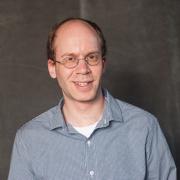 A self-identified “professional nerd,” Nathan Schneider joins both the computer science and linguistics departments from the University of Edinburgh, where he recently completed his postdoctoral fellowship. He leads interdisciplinary courses and research on the intersection of linguistics and computer science, specializing in computational linguistics and natural language processing — that is, using computational methods to study language and creating technology that can reason and process language. Nathan graduated from the University of California-Berkeley with a bachelor’s degree and from Carnegie Mellon with a Ph.D. He maintains a “collection of scholarly remarks on the mind-boggling versatility of the preposition ‘for.’”
A self-identified “professional nerd,” Nathan Schneider joins both the computer science and linguistics departments from the University of Edinburgh, where he recently completed his postdoctoral fellowship. He leads interdisciplinary courses and research on the intersection of linguistics and computer science, specializing in computational linguistics and natural language processing — that is, using computational methods to study language and creating technology that can reason and process language. Nathan graduated from the University of California-Berkeley with a bachelor’s degree and from Carnegie Mellon with a Ph.D. He maintains a “collection of scholarly remarks on the mind-boggling versatility of the preposition ‘for.’”
IAN LYONS
Department of Psychology
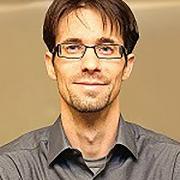
Ian Lyons is an assistant professor of psychology focusing on cognitive neuroscience, specifically mathematical thinking and symbol representation. He received his Ph.D. in psychology from the University of Chicago, and most recently completed his postdoctoral fellowship at Western University in Ontario.
NAGARJUNA GAVVALAPALLI
Department of Chemistry
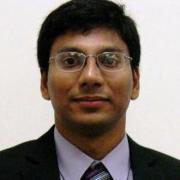 Nag Gavvalapalli is a newly appointed assistant professor in the department of chemistry and the Institute for Soft Matter, Synthesis and Metrology. He attended University of Massachusetts Amherst and University of Illinois at Urbana-Champaign for his graduate and postdoctoral research, respectively. His research at Georgetown College focuses on the rational design and development of smart polymers and nanostructures. Gavvalapalli’s research is focused toward realizing novel electronic and photonic materials. Students in his research group are trained at the interfaces of polymer chemistry, organic chemistry, and nanoscience. To learn more about his research, please visit his website.
Nag Gavvalapalli is a newly appointed assistant professor in the department of chemistry and the Institute for Soft Matter, Synthesis and Metrology. He attended University of Massachusetts Amherst and University of Illinois at Urbana-Champaign for his graduate and postdoctoral research, respectively. His research at Georgetown College focuses on the rational design and development of smart polymers and nanostructures. Gavvalapalli’s research is focused toward realizing novel electronic and photonic materials. Students in his research group are trained at the interfaces of polymer chemistry, organic chemistry, and nanoscience. To learn more about his research, please visit his website.
LUKE PLONSKY
Department of Linguistics
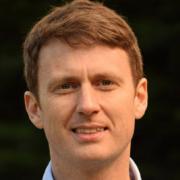 Luke Plonsky joins the the College as assistant professor in the applied linguistics concentration. His primary teaching and research interests include second language acquisition and research methods. Plonsky is an associate editor of Studies in Second Language Acquisition, managing editor of Foreign Language Annals, and co-director (with E. Marsden & A. Mackey) of IRIS: A digital repository of Instruments for Research into Second Language Learning and Teaching. Plonsky has taught in the Netherlands, Puerto Rico, Spain, the U.S., and most recently in the U.K. at University College London. Plonsky received his Ph.D. in second language studies from Michigan State University in 2011. Learn more about him at his website.
Luke Plonsky joins the the College as assistant professor in the applied linguistics concentration. His primary teaching and research interests include second language acquisition and research methods. Plonsky is an associate editor of Studies in Second Language Acquisition, managing editor of Foreign Language Annals, and co-director (with E. Marsden & A. Mackey) of IRIS: A digital repository of Instruments for Research into Second Language Learning and Teaching. Plonsky has taught in the Netherlands, Puerto Rico, Spain, the U.S., and most recently in the U.K. at University College London. Plonsky received his Ph.D. in second language studies from Michigan State University in 2011. Learn more about him at his website.
MARK MEYER
Department of Mathematics and Statistics
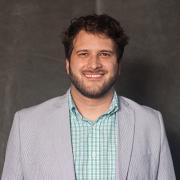 Mark Meyer is assistant professor of statistics and a biostatistician. His first stint in Washington, DC was as an undergraduate at American University (Class of 2008) and as a post-baccalaureate fellow at the National Institutes of Health. After that, Mark completed his graduate work at Harvard University, earning his master’s in 2011 and doctorate in 2014, both in biostatistics. Previously, he was an assistant professor of mathematics at Bucknell University where he taught statistics. Currently, his research focuses on developing novel methodologies for analyzing functional and categorical data. Meyer collaborates with researchers in a wide variety of disciplines, including environmental health, epidemiology, developmental medicine, animal behavior, and political science. This fall, he will be teaching Categorical Data Analysis (MATH 657). In the spring, he will be teaching Bayesian Statistics (MATH 640) as well as developing and teaching a new course for undergraduates: Biostatistical Methods.
Mark Meyer is assistant professor of statistics and a biostatistician. His first stint in Washington, DC was as an undergraduate at American University (Class of 2008) and as a post-baccalaureate fellow at the National Institutes of Health. After that, Mark completed his graduate work at Harvard University, earning his master’s in 2011 and doctorate in 2014, both in biostatistics. Previously, he was an assistant professor of mathematics at Bucknell University where he taught statistics. Currently, his research focuses on developing novel methodologies for analyzing functional and categorical data. Meyer collaborates with researchers in a wide variety of disciplines, including environmental health, epidemiology, developmental medicine, animal behavior, and political science. This fall, he will be teaching Categorical Data Analysis (MATH 657). In the spring, he will be teaching Bayesian Statistics (MATH 640) as well as developing and teaching a new course for undergraduates: Biostatistical Methods.
AMANDA PHILLIPS
Department of English
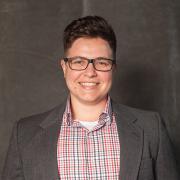 Amanda Phillips comes from the University of California, Davis, where she was the IMMERSe postdoctoral fellow for the ModLab Digital Humanities Collaboratory. She received her Ph.D. as a Mellon/ACLS dissertation completion fellow in the department of English at the University of California, Santa Barbara, with an emphasis certificate from the department of feminist studies. Her broad research interests are in social justice in and around technoculture, popular media, and the digital humanities. More specifically, she writes about video games and feminist, queer, and critical race theory. This fall, she’ll be teaching Intro to Video Game Studies.
Amanda Phillips comes from the University of California, Davis, where she was the IMMERSe postdoctoral fellow for the ModLab Digital Humanities Collaboratory. She received her Ph.D. as a Mellon/ACLS dissertation completion fellow in the department of English at the University of California, Santa Barbara, with an emphasis certificate from the department of feminist studies. Her broad research interests are in social justice in and around technoculture, popular media, and the digital humanities. More specifically, she writes about video games and feminist, queer, and critical race theory. This fall, she’ll be teaching Intro to Video Game Studies.
Phillips was born and raised in Tampa, Florida, and spent significant time in Houston, Texas, as an undergraduate at Rice University. She is coming to DC with her partner, Shyama, and their dog, Yakshi. She is a bicycle commuter and enjoys weightlifting in her spare time.
JUSTIN THALER
Department of Computer Science
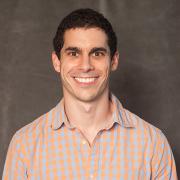 Justin Thaler is a computer scientist who is interested in the development of scalable algorithms that are efficient in both theory and practice. He is particularly interested in questions like: How can one design algorithms for analyzing massive datasets, even if there is so much data the the algorithm can store only a small fraction of it? How can one offload the processing of a massive dataset to a cloud computing service, and obtain a guarantee that the cloud is doing the processing correctly? Under what circumstances can machines make accurate predictions based on past experience or data?
Justin Thaler is a computer scientist who is interested in the development of scalable algorithms that are efficient in both theory and practice. He is particularly interested in questions like: How can one design algorithms for analyzing massive datasets, even if there is so much data the the algorithm can store only a small fraction of it? How can one offload the processing of a massive dataset to a cloud computing service, and obtain a guarantee that the cloud is doing the processing correctly? Under what circumstances can machines make accurate predictions based on past experience or data?
Prior to joining the College, Thaler spent two years as a research scientist at Yahoo Labs in New York City. Before that, he was a research fellow at the Simons Institute for the Theory of Computing at UC Berkeley. He received his Ph.D. in 2013 from the theory of computation group at Harvard University.
BRANDON DOTSON
Department of Theology
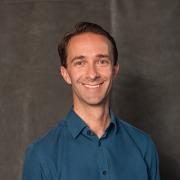 Brandon Dotson is associate professor of Buddhist studies. Before coming to Georgetown, he spent six years in Munich, where he led a research group. Before that, he spent nine years at Oxford University, where he did his graduate studies and a postdoctoral fellowship. Originally from Southern California, his work concerns ritual, narrative, and cosmology and the interaction of Buddhist and non-Buddhist traditions in the Tibetan cultural area. In particular, he works closely with Tibetan Dunhuang manuscripts to explore the history and culture of the Tibetan Empire (7th to 9th centuries CE). At Georgetown College he teaches courses on Buddhism, Tibetan Buddhism, and the Problem of God.
Brandon Dotson is associate professor of Buddhist studies. Before coming to Georgetown, he spent six years in Munich, where he led a research group. Before that, he spent nine years at Oxford University, where he did his graduate studies and a postdoctoral fellowship. Originally from Southern California, his work concerns ritual, narrative, and cosmology and the interaction of Buddhist and non-Buddhist traditions in the Tibetan cultural area. In particular, he works closely with Tibetan Dunhuang manuscripts to explore the history and culture of the Tibetan Empire (7th to 9th centuries CE). At Georgetown College he teaches courses on Buddhism, Tibetan Buddhism, and the Problem of God.